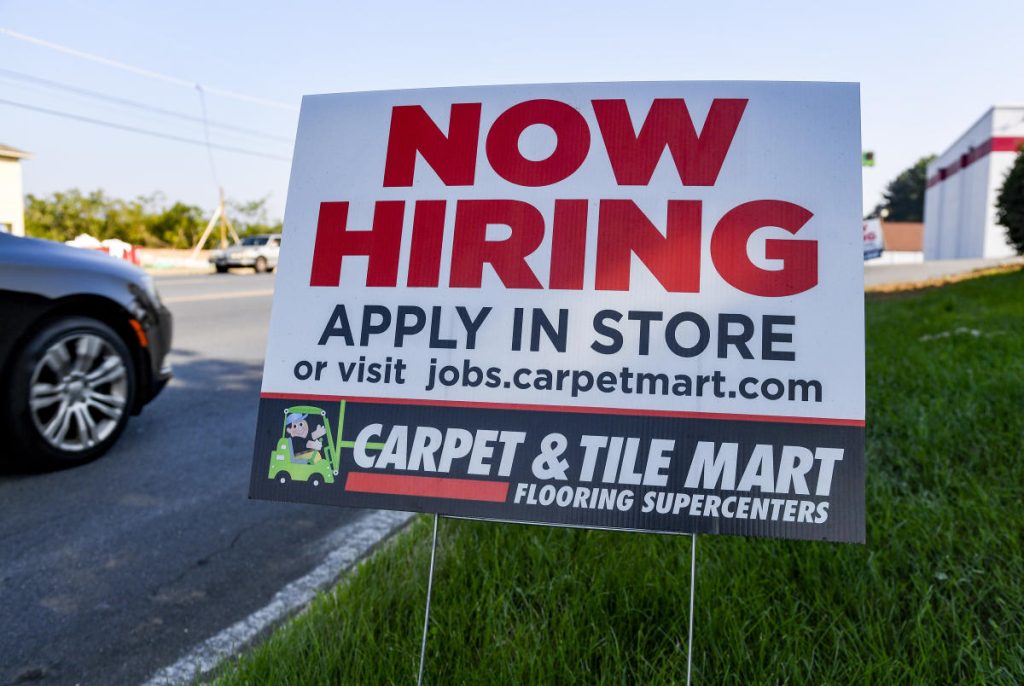
U.S. employers likely increased their pace of hiring in October after a sluggish September, with declining COVID-19 infections and demand for workers amid widespread shortages helping bolster labor market activity.
The Labor Department is set to release its October jobs report Friday morning. Here are the main metrics expected from the report, compared to consensus estimates compiled by Bloomberg:
- Change in non-farm payrolls, October: +450,000 expected, +194,000 in September
- Unemployment rate: 4.7% expected, 4.8% in September
- Average hourly earnings, month-over-month: 0.4% expected, 0.6% in September
- Average hourly earnings, year-over-year: 4.9% expected, 4.6% in September
Non-farm payrolls are expected to show the biggest jump in a single month since July. Though payrolls have grown in every month so far in 2021, the economy remains more than 5 million jobs short of its pre-pandemic levels following plunges in employment between March and April of 2020. And the civilian labor force was still down by about 3.1 million individuals compared to February 2020 as of September.
Hiring is expected to pick up in a broad range of industries for October, but leisure and hospitality employers could see an especially pronounced boost as concerns over the Delta variant receded and enabled more service employees to return to work. Leisure and hospitality jobs had averaged nearly 350,000 payroll gains per month between February and July, though this growth pulled back to just 56,000 between August and September during the latest wave of infections.
Job growth across the board, however, has failed to keep pace with employer demand. Job openings came in at a near-all-time high in August — the latest month for which data is available — while the quits rate soared by a record. And companies have been widely citing labor shortages in third-quarter earnings reports. Mentions of “labor” on earnings calls have skyrocketed by 320% over last year, according to data from Bank of America.
“My largest concern right now — outside of inflationary pressures — is ultimately what happens with this labor supply shortage, because the labor supply shortage feeds into the supply chain issues we’re seeing,” Kevin Mahn, Hennion & Walsh chief investment officer, told Yahoo Finance Live on Thursday. “Everyone is forecasting a record holiday shopping season, but there will be delays in shipping. I’m not concerned with consumers’ demand for products.”
Other economists offered similar concerns around labor scarcities.
“On balance, we look for a substantial rebound in the pace of non-farm hiring in October, with gradual improvement in the unemployment rate and sustained strength in earnings growth,” wrote Sam Bullard, chief economist for Wells Fargo, in a note. “While positive, employment growth remains constrained by the supply side, and there is little evidence that suggests material improvement is near.”
“Indeed, recent strike activity and vaccine mandates have been challenging factors on the supply front and suggest that labor market improvement will be gradual in coming months,” he added.
Still, the labor data heading into Friday’s report have been upbeat. ADP reported Wednesday that private payrolls jumped by a better-than-expected 571,000 in October, whereas just 400,000 were expected. New weekly unemployment claims came in at 269,000, or their lowest level since March 2020, and had also broken below the psychologically important 300,000 level in the middle of October during the Labor Department’s survey week for the monthly jobs report.
The labor market data is also important in helping inform the Federal Reserve’s moves on monetary policy. The central bank has signaled it is looking for more progress on bringing sidelined workers back into the labor force before adjusting the rate of its tapering program or considering a hike on interest rates.
“There is still ground to cover to reach maximum employment both in terms of employment and in terms of participation,” Federal Reserve Chair Jerome Powell said during his latest post-FOMC meeting press conference on Wednesday. He added that it was “within the realm of possibility” that the economy achieved maximum employment by the second half of next year, as measured by a broad range of metrics.
























